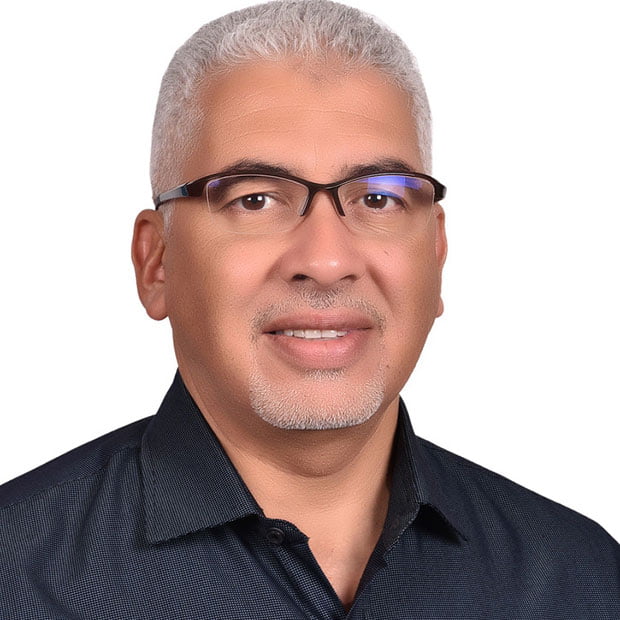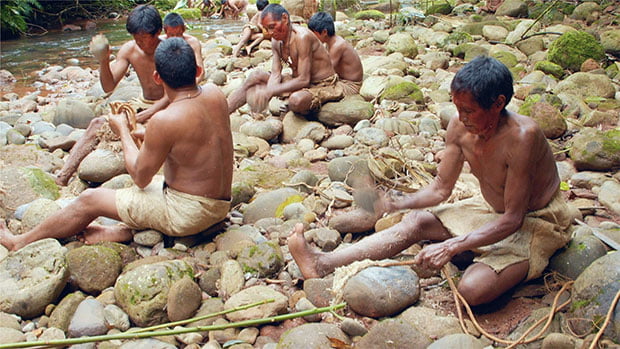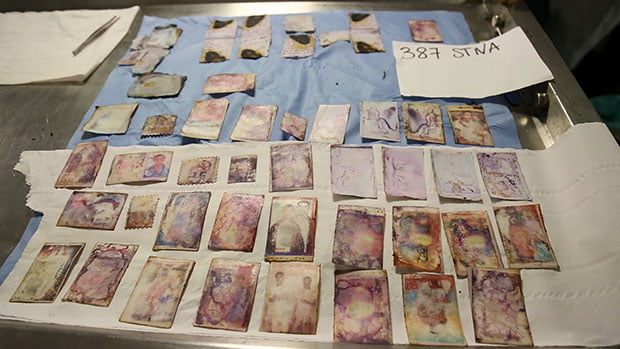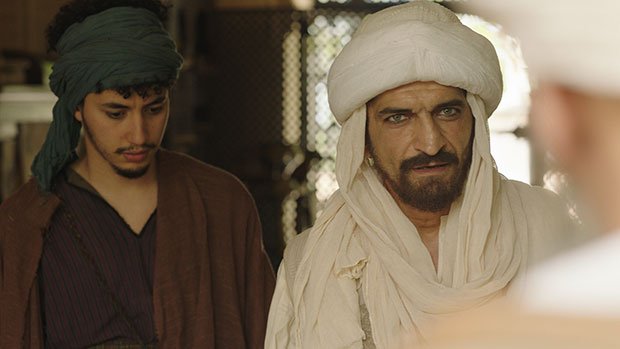Al Jazeera Documentary Channel – MENA
Al Jazeera Documentary Channel’s reach and visibility on and off the small screen is growing thanks to an expanding originals and coproductions strategy. Gün Akyuz reports.

Adel Ksiksi
Overview
Al Jazeera Documentary Channel is celebrating its 15th birthday this year. Virtually unchallenged in the Middle East and North Africa, it remains keen to be seen as the high-quality standard-bearer for the local documentary industry.
Part of the Al Jazeera Media Network of channels and services, the 24-hour Arabic-language documentary channel has amassed a library of more than 2,000 documentaries and 3,000 hours across a wide range of subjects and styles.
A growing part of the channel’s current content strategy is its slate of originals and coproductions. Each year the channel produces, coproduces and acquires around 400 hours of new content, split evenly between single films and series. This strategy has been bolstered by a broadening in approach to its distribution, which includes a growing festivals circuit and screenings in educational and cultural centres.
“Today, we can say that our content across the MENA region is much better powered,” observes the channel’s programming manager, Adel Ksiksi.
“We have lots of great new talent, filmmakers and producers working with us who are also more and more exposed to coproductions, mainly at an international level.”
As part of the global Al Jazeera Media Network, the channel plugs into a range of global resources that also serves flagship news and current affairs channel Al Jazeera Arabic and English, its sister net Al Jazeera Balkans and Al Jazeera Türk.
“Our audience is very loyal to us and we are ranked between the second and third best channels in MENA in terms of viewership,” says Ksiksi, pointing to a respectable 3-3.5% viewing share of the total market. Currently available in 23 countries across the region, Al Jazeera Documentary Channel alone clocked up over two billion viewer minutes in 2021, while its YouTube page alone attracted three million subscribers.

Discover the Unknown meets the people of the Amazon
Highlighting the clout of being part of Al Jazeera Media Network, Ksiksi claimed the parent group was the top brand in MENA, in terms of news, current affairs and documentaries. The network can amass over 100 million viewers for big event and an average 60 to 80 million overall.
Current programming, original production, acquisitions
Al Jazeera Documentary’s weekly schedule typically offers viewers four hours of fresh themed programming daily from 19.00, kicking off with series on arts, culture and travel, or alternatively the environment and wildlife. One-off docs follow daily at 20.00.
At 21.00, the channel switches to different themed strands each day of the week. Tuesdays, for example, are fronted by science strand Secrets of the Universe, Wednesdays by the People’s Inspirations strand. Thursday hosts Free Lens, dedicated to movies, and houses feature, festival, award-winning and experimental films of varying lengths.
Fridays and Saturdays – the weekend in the Middle East – host biography strand This is Me and a storytelling strand respectively. Sundays and Mondays, meanwhile, host Al Jazeera World, a weekly strand of documentaries sourced from across the Al Jazeera Media Network.
Among Al Jazeera Documentary’s most popular titles is the in-house-produced series Discover the Unknown (10×30’), now in its third season. The hosted, character-driven series, which focuses on discovering people and the environment, has so far covered Ethiopia, Indonesia and now the Amazon.
A key addition to Al Jazeera Documentary Channel’s line-up this year was a new weekly Monday slot, Kicks & Stories, at 20.00. Launched in January, the year-long strand hosts a range of football-related series and single docs, covering a range of topics on and off the pitch, from stories about footballers and “dreamers and amateurs” to the engineering aspects of building stadiums.

Maradona & Naples looks at the player’s relationship with the city
Examples range from one-off docs to series, including the recently aired Sand Ball (1×55’) on the Chadian national team, produced by Al Jazeera Documentary Channel and ZK Prod Doc and directed by Younes Jahad and Achille Rainmo. Coming up on October 24 is Maradona & Naples (1×52’), about the legendary Argentinian footballer’s time at the city’s club, produced by the channel with Domino Film and exec produced and directed by Mohamed Kenawi. World Cup Dreams (6×52’), focusing on young players from the second national teams of Spain, Brazil, Morocco, Iran, Ghana and Qatar, launches on November 7, produced by Morada Films together with the channel and exec produced and directed by Paula Palacios.
Each year, the channel selects a flagship theme to fit with its overall content aims, explains Ksiksi, with this year’s theme around football selected to coincide with the Fifa World Cup in Qatar.
The weekly 20.00 slot also adds a new regular weekly rendez-vous for the channel for the first time. 2021’s flagship theme, for instance, was Different Worlds, which aired monthly at 19.00, covering a wide range of themes from different continents through a mix of original productions and acquired fare. “We opened a window to our audiences with the content, [allowing them] to visit one continent every month,” says Ksiksi. Next year’s flagship theme is currently being finalised, he says.
Annually, original productions amount to around 80 hours of in-house production and coproductions across documentary films and series, says Ksiksi. Last year saw the channel coproduce more than 30 projects.
The channel buys in around 320 hours a year across a range of subjects and formats, either as one-offs or series. All are destined for its peak viewing slots between 19.00 and 23.00 over the week, where Ksiksi flags a current need for science, nature and environment docs.

Domino Film football copro World Cup Dreams
In terms of coproduction and acquisition partners, Ksiksi says the channel casts its net widely, although Europe remains an established source. Among its recent copro collaborations was Arte and Canvas’s doc Numéro 387 (aka The Watchmen) from filmmaker Madeleine Leroyer and Little Big Story Arte, about the plight of refugees in the Mediterranean. Alongside Al Jazeera Documentary Channel, the film attracted extensive participation from European pubcasters, including RTBF, EO, RTS, STV, DR, YLE, RUV and ERT, plus Canada’s TVO.
Another copro was 2022 feature doc Erazmus in Gaza (1×88’/52’), produced by Spain’s Arpa Films and Italy’s Feltrinelli Real Cinema with Al Jazeera in Qatar. Also being produced this year is feature doc Builders of the Alhambra. The film, from Isabel Fernandez, is a copro between El de las dos vidas AIE, Al Pati Producciones and Polar Star Films. Coproducing broadcasters include RTVE, ORF, Arte/ZDF and Aljazeera Documentary Channel, while SVT, Ceská Televise, MTVA Hungary, TV Slovakia and RTV in Slovenia are also participating.
Just as content suppliers have multiplied over the past 15 years, so has the channel’s network of content partnerships, including North America and Asia. “Now we are starting acquiring even from Africa, directly from African distributors,” he adds, noting that the channel’s expanding roster of distributor partners is making the job of acquiring 320 hours annually easier.
“We coproduce when there is good content that works and fits with our audience and with our needs,” says Ksiksi. “We’re continuing, as it’s strategic for us to coproduce because there’s a lot of content and we work with others.”
While its acquisitions team is already busy acquiring for 2023, coproductions come under its twice-yearly call for proposals, one in April and a second in November. From that November pitching round it will select the 80 projects to produce or coproduce next year.

Numéro 387 focuses on refugees in the Mediterranean
“We are looking for character-driven documentaries, award-winning documentaries, very recent ones and good in terms of subject and approach,” says the Ksiksi.
One advantage for potential partners is that Al Jazeera Documentary Channel needs rights only for the MENA region, “so we don’t have any problem with the rights,” he adds.
For coproduced content coming out of MENA, the win for Al Jazeera Documentary Channel’s producer partners is that the content will travel more and be more widely distributed, he says.
Al Jazeera Documentary Channel’s coproduction partnerships also come through its attendance at the many annual festivals and coproduction forums worldwide, including IDFA, Sunny Side of the Doc, Hot Docs and Sheffield DocFest, to name a few.
A new event soon joining the ranks is Al Jazeera Documentary Channel’s Industry Days initiative. The three-day pitching and copro event will launch as part of the group’s five-year-old annual Al Jazeera Balkans Doc festival in Sarajevo, which this year takes place from September 9 to 13.
A call for projects has already yielded over 175 submissions, says Ksiksi, with 34 finalists invited to pitch in Sarajevo. “What we are adding to Al Jazeera Balkans Doc festival is what Al Jazeera Documentary Channel is doing in terms of coproduction,” says the exec, flagging up south-eastern Europe and the Caucuses as already regular sources of acquisitions and a few copros, alongside MENA.
Ksiksi says the latest pitching format will expose projects and filmmakers to international expertise “to help enhance the quality of the project, enhance the quality of pitches, enhance the quality of people involved and exchange expertise. You could say everyone is a winner with this pitching forum.”

Upcoming feature doc copro Builders of the Alhambra
As part of its current three-year strategic plan, Al Jazeera Documentary Channel has already built up a range of external partnerships. In the past year, Ksiksi says it has agreed more than 15 new distribution partnerships for its documentaries, ranging from TV channels, cinemas and festival screenings to educational and cultural centres across the region. “Every month we have a screening somewhere,” he says.
For the first time it has also led to over 40 of the channel’s films being screened at different festivals in 2021 and the first quarter of 2022. “Forty hours is quite a good amount of hours for those who are coproducing with us,” Ksiksi notes.
For producer partners, it means a window of six months to a year on the festival circuit, ahead of the channel airing it. Ksiksi says this strategy will be expanded next year.
Another key development is a new OTT service now being prepared by Al Jazeera Media Network’s now centralised digital division.
Expected by the end of 2022 or early 2023, the new service is set to open up more digital-only content creation opportunities. Digital-only content is already part of the mix at both channel and group level, such as via the youth-skewing AJ+ service for social media platforms, which launched in 2014.
“Firstly, it will be another opportunity for our own-produced content to be distributed globally, giving us new reach and new audiences,” says Ksiksi. “Secondly, we’ll produce and acquire specially for digital, with rights suitable for the digital environment.”
For young filmmakers and producers across MENA, it also offers a more centralised entry point to the Al Jazeera Media Network. “Previously, a producer had to travel between our channels to pitch his projects. Today, there is another opportunity with digital,” says Ksiksi.

Sand Ball follows the Chadian national team
However, for now, Ksiksi says Al Jazeera Documentary Channel will be sticking broadly to its current scheduling strategy and three-year strategic plan, which runs until the end of 2023.
As for the channel’s impact on the landscape so far, Ksiksi says: “The human being is the legacy here, and when we say human being, it is the industry as a whole. We’re very proud to announce today that in 15 years we have helped to establish a very good industry environment within MENA.
“When we started we were working with maybe 30 producers and filmmakers. Today, there are more than 300 filmmakers and producers. More than that, we are investing more in new talent, because they’re very creative, very enthusiastic and it keeps our content fresh.”
Ksiksi is equally keen to highlight the near 50/50 gender parity for creatives on its productions, with the channel now attracting “the best films and female filmmakers.”
If Al Jazeera Documentary Channel has helped grow and nurture a local talent pool, Ksiksi says it has also created a few, albeit nice-to-have, challenges. “We produce only 80 hours and we have more than 300 filmmakers and producers submitting to us.”
Its last call in April attracted almost 900 proposals from across the region.



















.jpg)




























